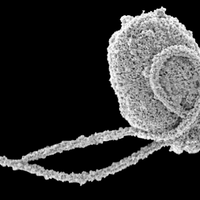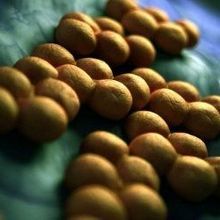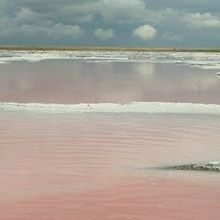Login
Subscribemicrobiology, evolution

Image Of The Day: Predatory Protists
Nicoletta Lanese | Jul 19, 2019 | 1 min read
The protist Rhodelphis limneticus bears little resemblance to its close genetic relative, red algae.

Opinion: Individuals Are Greater Than the Sum of Their Parts
Itzhak Mizrahi and Fotini Kokou | Mar 1, 2019 | 2 min read
The study of evolution requires consideration of organisms’ microbiomes.

Prehistoric Microbes Inhabit an Oasis in the Northern Mexican Desert
Diana Kwon | Mar 1, 2019 | 4 min read
The blue lagoons of the Cuatro Ciénegas Basin provide a glimpse into the planet’s ancient past.

Archaea CRISPR Systems Grab DNA Memories During Interspecies Mating
Carolyn Wilke | Mar 1, 2019 | 2 min read
When different archaeal species mate, their CRISPR systems interact in ways that may influence their evolution.

From Little Things Big Things Grow
Bob Grant | Jun 1, 2018 | 3 min read
We should take comfort in the fact that life on Earth had such unassuming, shared beginnings.

Archaea Family Tree Blossoms, Thanks to Genomics
Amber Dance | Jun 1, 2018 | 10+ min read
Identification of new archaea species elucidates the domain’s unique biology and sheds light on its relationship to eukaryotes.

Infographic: Can Archaea Teach Us About the Evolution of Eukaroyotes?
Amber Dance | May 31, 2018 | 3 min read
The discovery of copious new archaeal species is shedding light on the tree of life and revealing some unique cellular biology.

Fungus Repurposed a Bacterial Gene to Sense Gravity with Crystals
Viviane Callier | Apr 24, 2018 | 3 min read
Rather than getting a gene for its original function, a horizontal gene transfer provides the raw material for evolutionary innovation.

Opinion: “Drug Sanctuaries” Offer Hope to a Post-Antibiotic World
Rees Kassen | Apr 24, 2018 | 4 min read
Drug-free environments, such as a designated ward in a hospital, might reduce the strength of selection for resistance.

Monitoring Mutations with Microfluidics
Ruth Williams | Mar 15, 2018 | 3 min read
A device dubbed the “mother machine” enables real-time observation of mutagenesis in single bacterial cells.

In Canada, Signs of Life Nearly 4 Billion Years Old
Ashley P. Taylor | Sep 28, 2017 | 2 min read
Embedded within 3.95-billion-year-old rock, scientists have found graphite with a carbon signature that indicates biological activity.

Researchers Discover Salt-Loving Methanogens
Abby Olena, PhD | May 26, 2017 | 3 min read
Two previously overlooked archaeal strains fill an evolutionary gap for microbes.

Giant Petri Dish Displays Evolution in Space and Time
Jenny Rood | Sep 8, 2016 | 3 min read
As E. coli bacteria spread over increasingly concentrated antibiotics, researchers discover novel evolutionary pathways that confer resistance.

Promoting Protein Partnerships
Ruth Williams | Sep 1, 2016 | 3 min read
Scientists generate new protein-protein interactions at an impressive PACE.

Protein or Perish
Ruth Williams | Aug 31, 2016 | 1 min read
A bacteriophage must evolve certain variants of a protein or die.

Multicellular Cooperation Curbs Cheating
Jenny Rood | Jul 1, 2016 | 2 min read
An experimental evolution study shows that more cheaters arise when bread mold fungal cells are less related to one another.

Hot Off the Presses
Bob Grant | Jul 1, 2016 | 3 min read
The Scientist reviews Serendipity, Complexity, The Human Superorgasism, and Love and Ruin

Similar Data, Different Conclusions
Ashley P. Taylor | Feb 23, 2016 | 6 min read
By tweaking certain conditions of a long-running experiment on E. coli, scientists found that some bacteria could be prompted to express a mutant phenotype sooner, without the “generation of new genetic information.” The resulting debate—whether the data support evolutionary theory—is more about semantics than science.

All Together Now
Mary Beth Aberlin | Jan 1, 2016 | 3 min read
Understanding the biological roots of cooperation might help resolve some of the biggest scientific challenges we face.

Gene Jumped to All Three Domains of Life
Kerry Grens | Dec 1, 2014 | 1 min read
By horizontal gene transfer, an antibacterial gene family has dispersed to a plant, an insect, several fungi, and an archaeon.